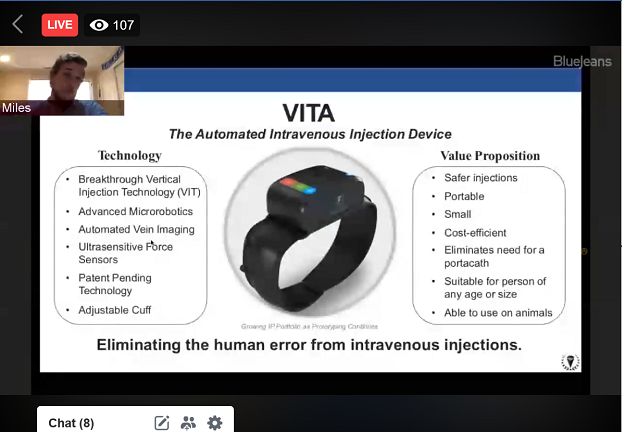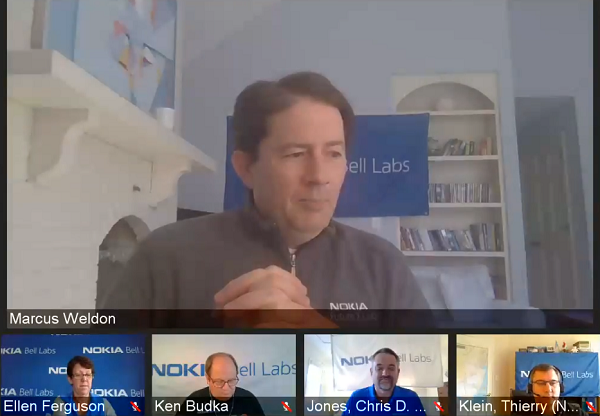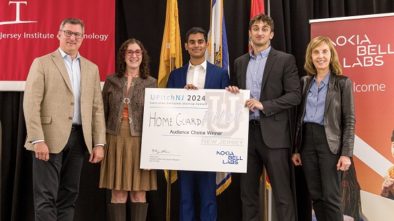Princeton Bio-Device Startup Wins UPitchNJ 2020 Hosted by Nokia Bell Labs
A Princeton startup with a better way to position needles for infusions won the fifth annual UPitchNJ competition, held as a virtual meeting on May 1.
UPitchNJ is a business-model contest that brings together the top-performing startups from New Jersey’s four-year colleges and universities.
The event is organized by the New Jersey Collegiate Entrepreneurship Consortium, which represents the entrepreneurship education programs at New Jersey’s four-year colleges and universities; and it’s chaired by Susan Scherreik, who’s the founding director of the Center for Entrepreneurial Studies, at Seton Hall University’s Stillman School of Business.
Ten universities participated in this year’s competition: Fairleigh Dickinson University, Kean University, Montclair State, New Jersey City University, NJIT, Princeton, Ramapo College of New Jersey, Rutgers, Saint Peter’s University and Seton Hall.
Six startups made it to the final round, which involved founders making a virtual pitch and fielding questions from an all-star group of judges from Nokia Bell Labs in Murray Hill. The students had also been mentored by senior executives from Nokia Bell Labs.
The judges were Marcus Weldon, president and corporate CTO of Nokia Bell Labs; Kenneth C. Budka, senior partner, verticals, enterprise and new business models at Bell Labs Consulting; Ellen Ferguson, operations and planning lead at Nokia Bell Labs and member of the board of directors of the Research & Development Council of New Jersey; and Christopher Jones, head of the Technology Strategy and Architecture Group at Nokia Bell Labs.
Invictis

Invictis Technologies founder Miles Cole, from Princeton University, took the $2,000 first prize for his invention of an apparatus that correctly positions a needle for patients who need injections or infusions. Cole developed the device due to a problem he has every day: As a hemophiliac, he has to infuse himself intravenously with medications to help his blood clot. Cole explained that it’s pretty difficult to be successful on the first attempt.
“A lot of the times, I’ll have to stick myself two or three times before actually hitting a vein. Now, this is a huge problem, and not only in my life. The national average for trained nurses for successfully getting in on the first attempt is only 75 percent. Not only are these extra injections painful, obviously, but they’re also expensive, costing the United States healthcare sector over $3 billion a year due to the injuries and infections that these unnecessary and additional needle sticks cause.”
Cole said that the startup currently has a working prototype for a device that can successfully image and inject the veins of a “human arm analog” with extreme accuracy. The next step is to miniaturize the prototype.
Mavocare
Second place, with the prize of $1,500, went to Mavocare, the entry from Montclair State University. The startup has a product in the all-natural feminine personal care space. Founder Lisa Noesi spoke about her problem with yeast infections, and how she found something that worked when she went to Colombia on a backpacking trip. That product contained lactic acid and the calendula flower, which has antifungal, antibacterial and anti-inflammatory properties, she said, noting that lactic acid strengthens the good bacteria in the vaginal area.
Noesi added that the students working with her spent a year ensuring that Mavocare’s manufacturer used organically sourced and globally certified ingredients. “Our target market, or people, are women ages 15 to 60 who have used feminine care in the past and are looking to switch to a more conscious-based personal care regimen. We’re looking to start with e-commerce, and then launch to higher-end retailers.”
Knowt
Taking home the $1,000 prize for third place was Knowt, an early-stage startup from Rutgers University. It was pitched by Abheek Pandoh, who cofounded the company with Abhishek Patel. Knowt offers an app that helps students review their class notes. “The way you learn is just as important as what you learn, which is why we came up with an app for iOS, Android and the web that uses artificial intelligence [AI] and machine learning to automatically create quizzes from your notes. With Knowt, you can use any of your notes without changing a thing and take practice quizzes that help you learn and actually retain information,” said Pandoh.
“Our core product is very simple. Type your notes directly into the app or import them from a variety of sources, such as Google Drive or PowerPoint or even your handwritten notes. Then you hit ‘Quiz.’”
MAPD
The prize of $1,500 for the “Best Early Stage Startup” went to MAPD, founded by NJIT students Owais Aftab, Adolfo Nakamura, Sravana Nuti and Akm Islam Zahir.
MAPD is a solution for audiologists and physicians when they test their patients for auditory processing disorder, so that people with this condition will never again have to ask, “What?” said Aftab, who pitched for the group. Auditory processing disorder prevents patients from correctly discerning spoken words. Normal hearing aids don’t help with this problem, so 20 percent of hearing-aid users with this disorder become frustrated and stop using their devices. The team has developed a “new standard of care” to help physicians diagnose hearing loss due to this disorder, which is the result of deficiencies in the central nervous system.
“By streamlining the tedious tests, we can increase the audiologist’s efficiency and their ability to see more patients,” Aftab stated. The team believes that there is a $1.8 million accessible market in New Jersey and a $70 million market nationwide. “We can expand this market in the future. This is because there’s an undertreated population of 25 million people in the U.S. that struggle with hearing in situations with background sounds,” he said. And, “by developing new diagnostic solutions,” MAPD can help get them treated.
Signs of Communication
After all the presentations were done, the audience was able to vote on the startup they liked the best, and they chose Signs of Communication, presented by Kelly McKenna, from New Jersey City University. The “Audience Choice Award” netted her $500.
McKenna said, “The problem in today’s society is that we are unable to have a live translation between deaf and hearing individuals. This could be as simple as ordering a coffee in a coffee shop.” She said that Signs of Communication will provide a connection between American Sign Language users and the rest of the world, overcoming any language or communication barriers.
She proposed an AI-enabled app on a smartphone that the hearing user would initiate by pointing the camera at the signing individual. Then the user can listen or watch the screen as the app translates the sign language into spoken English and English text. The app will require thousands of data sets to train the machine learning, she said. But, fortunately, Google and Microsoft have already made many data sets available.
The video of UPitchNJ for 2020 can be found here.




